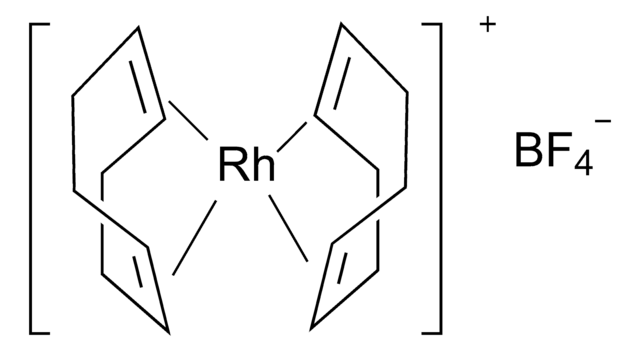Wichtige Dokumente
341134
[1,4-Bis(diphenylphosphin)butan](1,5-cyclooctadien)rhodium(I)-tetrafluorborat
98%
Synonym(e):
[Rh(dppb)(COD)]BF4
About This Item
Empfohlene Produkte
Qualitätsniveau
Assay
98%
Eignung der Reaktion
core: rhodium
reagent type: catalyst
mp (Schmelzpunkt)
205 °C (dec.) (lit.)
SMILES String
[Rh+].F[B-](F)(F)F.C1CC=CCCC=C1.C(CCP(c2ccccc2)c3ccccc3)CP(c4ccccc4)c5ccccc5
InChI
1S/C28H28P2.C8H12.BF4.Rh/c1-5-15-25(16-6-1)29(26-17-7-2-8-18-26)23-13-14-24-30(27-19-9-3-10-20-27)28-21-11-4-12-22-28;1-2-4-6-8-7-5-3-1;2-1(3,4)5;/h1-12,15-22H,13-14,23-24H2;1-2,7-8H,3-6H2;;/q;;-1;+1/b;2-1-,8-7-;;
InChIKey
YESRLRPURJQQBI-ONEVTFJLSA-N
Allgemeine Beschreibung
Anwendung
- Regioselektive Hydrierung von Thebain für die Synthese von Tetrahydrothebain.
- Enantioselektive reduktive Aminierung von α-Ketosäuren mit Benzylaminen für die Synthese von α-N-Benzylaminosäuren.
- Stereoselektive Hydrierung von α-(Hydroxymethyl)-acrylat-Derivaten für die Synthese von 3-Hydroxy-2-methylpropanoaten.
Signalwort
Warning
Gefahreneinstufungen
Acute Tox. 4 Dermal - Acute Tox. 4 Inhalation - Acute Tox. 4 Oral - Eye Irrit. 2 - Skin Irrit. 2 - STOT SE 3
Zielorgane
Respiratory system
Lagerklassenschlüssel
11 - Combustible Solids
WGK
WGK 3
Flammpunkt (°F)
Not applicable
Flammpunkt (°C)
Not applicable
Persönliche Schutzausrüstung
dust mask type N95 (US), Eyeshields, Gloves
Hier finden Sie alle aktuellen Versionen:
Besitzen Sie dieses Produkt bereits?
In der Dokumentenbibliothek finden Sie die Dokumentation zu den Produkten, die Sie kürzlich erworben haben.
Kunden haben sich ebenfalls angesehen
Unser Team von Wissenschaftlern verfügt über Erfahrung in allen Forschungsbereichen einschließlich Life Science, Materialwissenschaften, chemischer Synthese, Chromatographie, Analytik und vielen mehr..
Setzen Sie sich mit dem technischen Dienst in Verbindung.










![Bicyclo[2.2.1]hepta-2,5-dien-rhodium(I)-chloriddimer 96%](/deepweb/assets/sigmaaldrich/product/structures/700/585/b2e5ae1d-2b88-42c8-a071-ef828d4a104c/640/b2e5ae1d-2b88-42c8-a071-ef828d4a104c.png)
![1,5-Cyclooctadien-{[dibenzyl-((4S,5S)-5-methyl-2-phenyl-4,5-dihydro-4-oxazolyl)-methyl]-dicyclohexylphosphinit-κN:κP}-iridium(I)-tetrakis-(3,5-bis(trifluormethyl)-phenyl)-borat 97%](/deepweb/assets/sigmaaldrich/product/structures/139/575/e2052bbf-fcaa-4d37-a53a-3cab3894162b/640/e2052bbf-fcaa-4d37-a53a-3cab3894162b.png)
